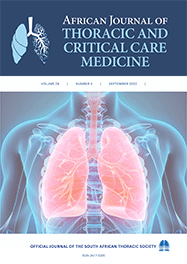Original research

The prevalence and management of rifampicin-resistant tuberculosis among adults at Chris Hani Baragwanath Academic Hospital, Johannesburg, South Africa
Abstract
Background. Early effective management of drug-resistant tuberculosis (TB) is important for the patient, and for infection control. The Xpert MTB/RIF (Cepheid, USA) assay detects Mycobacterium tuberculosis DNA and the presence of rifampicin resistance.
Objective. To assess the prevalence and initial management of rifampicin-resistant pulmonary TB (PTB), confirmed by the Xpert MTB/RIF assay, in hospitalised adult patients.
Methods. This retrospective descriptive study assessed adult patients from March 2011 to February 2013. Data was obtained from the National Health Laboratory Service database and patient records. Management comprised the submission of additional confirmatory sputum tests, initiation of appropriate anti-TB drug therapy, patient isolation, and proper referral.
Results. The prevalence of rifampicin resistance was 10.6% (n=77) of 729 positive assays. The initial management was assessed for 70 patients with complete records. However, of these 70 patients, 12 patients had been discharged and 5 patients had died prior to receiving their results. The management of the total cohort, and of the 53 remaining inpatients, was analysed separately. The overall confirmatory sputum submission rates were 76%, 60%, 60% and 26% for TB microscopy, Line Probe Assay, TB culture, and drug-susceptibility testing, respectively, and 87%, 72%, 68% and 30%, respectively for the 53 remaining patients. Overall, 33% of patients received appropriate anti-TB treatment, 50% were isolated, and 49% were appropriately referred. For the 53 remaining patients, 43% received appropriate drug treatment, 66% were isolated, 64% were appropriately referred, and 19% were not referred. The inpatient mortality rate was 19%.
Conclusions. Rifampicin-resistant TB prevalence in-hospital was more than double the national rate. The initial management of patients with rifampicin-resistant PTB was substandard. Submission of paired sputum samples and educating healthcare professionals and healthcare users are of paramount importance to improve the management of drug-resistant TB.
Authors' affiliations
R M Narsing, Division of Pulmonology, Department of Internal Medicine, Chris Hani Baragwanath Academic Hospital, Johannesburg, South Africa; School of Health Sciences, University of the Witwatersrand, Johannesburg, South Africa.
A S Karstaedt, Division of Infectious Diseases, Department of Internal Medicine, Chris Hani Baragwanath Academic Hospital, Johannesburg, South Africa; School of Health Sciences, University of the Witwatersrand, Johannesburg, South Africa.
F Sahid, Division of Infectious Diseases, Department of Internal Medicine, Chris Hani Baragwanath Academic Hospital, Johannesburg, South Africa; School of Health Sciences, University of the Witwatersrand, Johannesburg, South Africa.
Full Text:
Cite this article
Article History
Date published: 2017-06-22
Article Views
Full text views: 534
Refbacks
- There are currently no refbacks.
African Journal of Thoracic and Critical Care Medicine| Online ISSN: 2617-0205
This journal is protected by a Creative Commons Attribution - NonCommercial Works License (CC BY-NC 4.0) | Read our privacy policy.
Our Journals: South African Medical Journal | African Journal of Health Professions Education | South African Journal of Bioethics and Law | South African Journal of Child Health | Southern African Journal of Critical Care | African Journal of Thoracic and Critical Care Medicine| South African Journal of Obstetrics and Gynaecology |



.jpg)